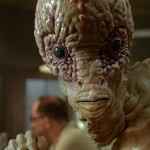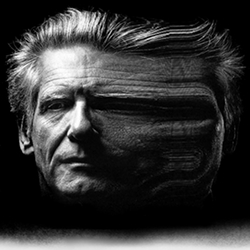
TIFF’s From Within - The Films of David Cronenberg Review: The Fly (1986) - NP Approved

Cast: Jeff Goldblum, Geena Davis, John Getz
Director: David Cronenberg
Country: USA | UK | Canada
Genre: Horror | Sci-Fi
Editor’s Notes: The following review is part of our coverage for TIFF’s From Within: The Films of David Cronenberg which runs from November 1st to January 19th at TIFF Bell Lightbox. For more information on upcoming TIFF film series visit http://tiff.net and follow TIFF on Twitter at @TIFF_NET.
David Cronenberg’s masterful 1986 horror film The Fly intuitively understands that the best horror films deal with internal, not external, threats. Sure, there’s enough external evil in the world to keep anyone busy, but none of the badness out there strikes as close to home as that which inhabits our own bodies. Humans seem unique among animals in their pervasive fear and shame at their own bodies; from snot to poop to any other excretion, we keep private what we cannot keep contained within ourselves. The fear that our bodies might escape our control touches on the deepest recesses of human terror. Keep your crazed stalkers - for a good scare I’ll take Seth Brundle transforming bit by excruciating bit any day.
David Cronenberg’s masterful 1986 horror film The Fly intuitively understands that the best horror films deal with internal, not external, threats.
In many ways The Fly is a minimalist film with maximalist ideas. There are only three main characters and hardly any beyond that. The film uses only a few sets. Even the plot remains fairly straightforward, going for slow burn intensity rather than labyrinthine twists and turns. Because of this languid (by horror standards, at least) pace, Cronenberg’s film has the space necessary to tease out some big questions. What is the place of technology in human life? What, in fact, does it even mean to be human? Like a much more disgusting version of Frankenstein, The Fly pairs these questions with twisted circumstances to create a haunting vision of horror.
Science journalist Veronica Quaife (Geena Davis) meets Seth Brundle (Jeff Goldblum) at a party and soon discovers Brundle’s odd, exciting area of research. Brundle works alone, secluded in a warehouse, tinkering away at a teleportation device. Despite the proddings of her ex-boyfriend/boss Stathis Borans (John Getz), Quaife foregoes an instant story in order to gain a more detailed look at Brundle’s work. Their closeness brings them together, and they become romantically involved. She even helps Brundle solve the central problem of his work: how to transport organic matter (for example, a baboon) without having something go terribly wrong (for example, inside out baboon). But then, as they say, something goes terribly wrong. A drunk Brundle decides to teleport himself but unknowingly traps the title creature in the telepod with him.

At first Brundle feels amazing. His experiment has “purified” him, he claims, given him super strength and agility. He describes himself as “penetrating the veil of the flesh”, of moving in some sense beyond the bounds of humanity. Veronica feels something amiss, though, and not just because Brundle keeps putting spoonful after spoonful of sugar in his cappuccinos. Brundle is no longer the shy, sensitive man he was before. He turns brutal, shunning Veronica when she refuses to teleport herself. When she returns to the warehouse after a month’s absence, Brundle has begun in earnest his transformation into what he describes as the “Brundlefly”. His skin looks terribly deformed, body parts keep falling off, and he finds himself crawling on the ceiling more easily than he can walk.
Veronica pities Seth, but that pity turns to horror when she discovers that she is carrying his baby. At this point Cronenberg kicks up the fear factor, throwing liberal dashes of Rosemary’s Baby into the mix, including a disgusting birth nightmare. This twist works especially well to underscore the terror of the flesh that runs through the movie. Seth sees the baby as a potential way to make himself more human again, but for Veronica it is an abomination that must be killed. Brundlefly captures Veronica before she can have an abortion, which leads to a final scene back at the warehouse where the husk of Seth Brundle attempts one last gene splice. The man finally gives way to the fly, however, and in the end Veronica gives her former lover the only mercy left to him, ending his life.
Evaluated simply as a horror film, there’s plenty to say in The Fly’s favor. First and foremost are the visual effects. Chris Walas, designer of the fly and the makeup specialist for the film, rightly earned an Oscar for his work.
Evaluated simply as a horror film, there’s plenty to say in The Fly’s favor. First and foremost are the visual effects. Chris Walas, designer of the fly and the makeup specialist for the film, rightly earned an Oscar for his work. As Brundle degenerates, the effects get more and more off putting - eventually chunks of skin and bone fall off the Brundlefly wholesale. Equally disturbing is the enzyme the creature spits out (or rather vomits up) to help him digest his food. At once distinctly reminiscent of and entirely other than a baby’s spit up, the substance evokes both pity at Brundle’s helplessness and revulsion at his inhumanity. The effects could easily have wound up overshadowing the film itself, but they never feel like a distraction from the substance of what Cronenberg has to say. Howard Shore’s score is equally adept at creating terror without calling attention to itself.

At the core of the film lies Goldblum’s performance, which is utterly captivating. Athletic isn’t the first word that leaps to my mind when I hear Goldblum’s name, but his physicality is essential to his role. He brings a thick, even intimidating masculinity to the section of the film right after the teleportation, which he spends largely shirtless. Yet this masculinity comes wedded to vulnerability. He starts the film a recluse, unsure of himself around other people, and Goldblum plays this up. Perhaps the most devastating shot comes not at the end but pre-Brundlefly. Sitting in the telepod, naked and waiting, Brundle appears completely open. He thinks he waits to embrace the future, but rather ends up grabbing hold of something he cannot contain.
The film, like Goldblum, lies open to those that find it. Many people have read into it a metaphor for AIDS, which seems apt given the decade in which it was made, and the very startling ravages Brundle’s transformation wreaks on his body. Cronenberg himself sees it as a broader picture of disease and aging, of the breakdown and betrayal we all face at the hands of our bodies. Yes and yes, but there is perhaps even more to be drawn out of the depths of The Fly. It seems on the one hand to offer a strong warning against the excesses of technology. Society finds the allure of technology irresistible, always supposing the best about its intentions and results. Yet for all its benefits, technology brings with it a dark side, heightening the potential damage which man can bring to bear upon himself, others, and the earth. In a sense we need more horror in the tradition of Frankenstein, reminders that “we can” does not equate with “we should”. The Fly is a worthy entry in that cautionary genre.
Below even this, well down beneath the surface, questions of humanity linger. Brundle makes clear that for all his tinkering the teleporter only gives a best approximation of the things it transports. Even if he had gone through sans fly, would post-teleportation Brundle have been the real Brundle? Philosophers and theologians have long obsessed over questions of personal identity, and The Fly poses similar problems. The fly half of Brundlefly slowly takes control - does this mean that animal brutality will inevitably win out over human reasoning? As the body deteriorates does the mind give way to vicious instinct? Or does there remain hope that, even at the point of most extreme alienation from human things, human beings retain some spark of humanity? The Fly asks these questions without providing answers, but wraps its deep riddles in a delicious coating of blood, guts, and gore.
Related Posts
![]()
Asher Gelzer Govatos
![]()
Latest posts by Asher Gelzer Govatos (see all)





























